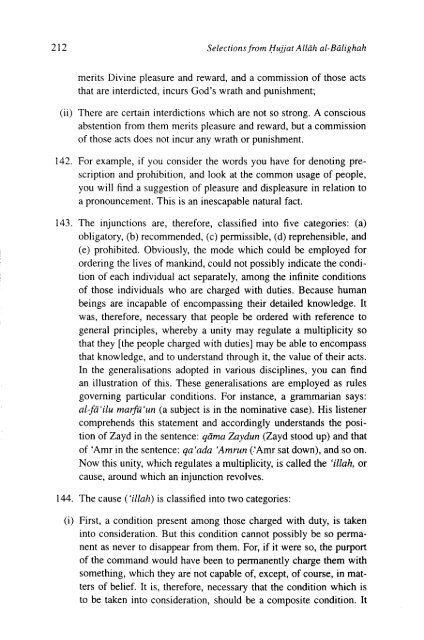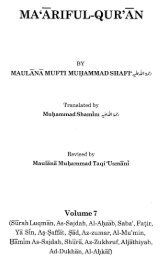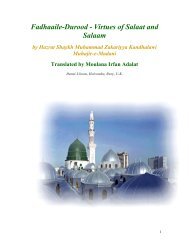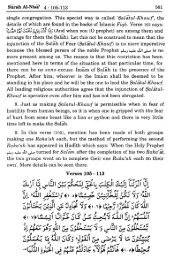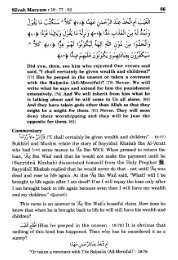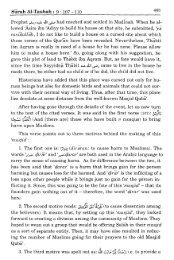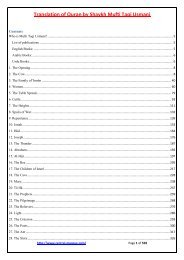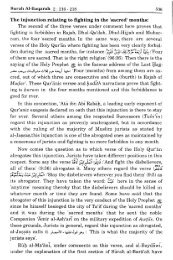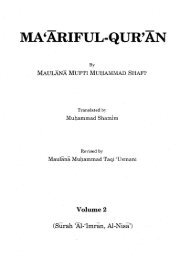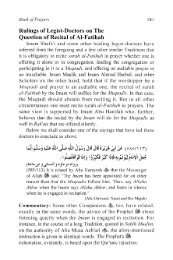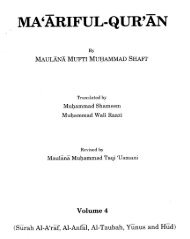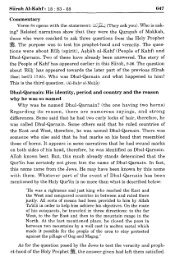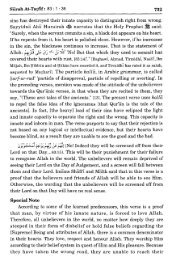Socio Political Thought Of Shah WaliAllah Rahmatullahi Alaihi
Socio Political Thought Of Shah WaliAllah Rahmatullahi Alaihi
Socio Political Thought Of Shah WaliAllah Rahmatullahi Alaihi
You also want an ePaper? Increase the reach of your titles
YUMPU automatically turns print PDFs into web optimized ePapers that Google loves.
212 Selections from Hujjat Alldh al-Bdlighah<br />
merits Divine pleasure and reward, and a commission of those acts<br />
that are interdicted, incurs God's wrath and punishment;<br />
(ii) There are certain interdictions which are not so strong. A conscious<br />
abstention from them merits pleasure and reward, but a commission<br />
of those acts does not incur any wrath or punishment.<br />
142. For example, if you consider the words you have for denoting prescription<br />
and prohibition, and look at the common usage of people,<br />
you will find a suggestion of pleasure and displeasure in relation to<br />
a pronouncement. This is an inescapable natural fact.<br />
143. The injunctions are, therefore, classified into five categories: (a)<br />
obligatory, (b) recommended, (c) permissible, (d) reprehensible, and<br />
(e) prohibited. Obviously, the mode which could be employed for<br />
ordering the lives of manlund, could not possibly indicate the condition<br />
of each individual act separately, among the infinite conditions<br />
of those individuals who are charged with duties. Because human<br />
beings are incapable of encompassing their detailed knowledge. It<br />
was, therefore, necessary that people be ordered with reference to<br />
general principles, whereby a unity may regulate a multiplicity so<br />
that they [the people charged with duties] may be able to encompass<br />
that knowledge, and to understand through it, the value of their acts.<br />
In the generalisations adopted in various disciplines, you can find<br />
an illustration of this. These generalisations are employed as rules<br />
governing particular conditions. For instance, a grammarian says:<br />
alfi 'ilu ma&-'un (a subject is in the nominative case). His listener<br />
comprehends this statement and accordingly understands the position<br />
of Zayd in the sentence: qama Zaydun (Zayd stood up) and that<br />
of 'Amr in the sentence: qa 'ada 'Amrun ('Amr sat down), and so on.<br />
Now this unity, which regulates a multiplicity, is called the 'illah, or<br />
cause, around which an injunction revolves.<br />
144. The cause ('illah) is classified into two categories:<br />
(i) First, a condition present among those charged with duty, is taken<br />
into consideration. But this condition cannot possibly be so permanent<br />
as never to disappear from them. For, if it were so, the purport<br />
of the command would have been to permanently charge them with<br />
something, which they are not capable of, except, of course, in matters<br />
of belief. It is, therefore, necessary that the condition which is<br />
to be taken into consideration, should be a composite condition. It


